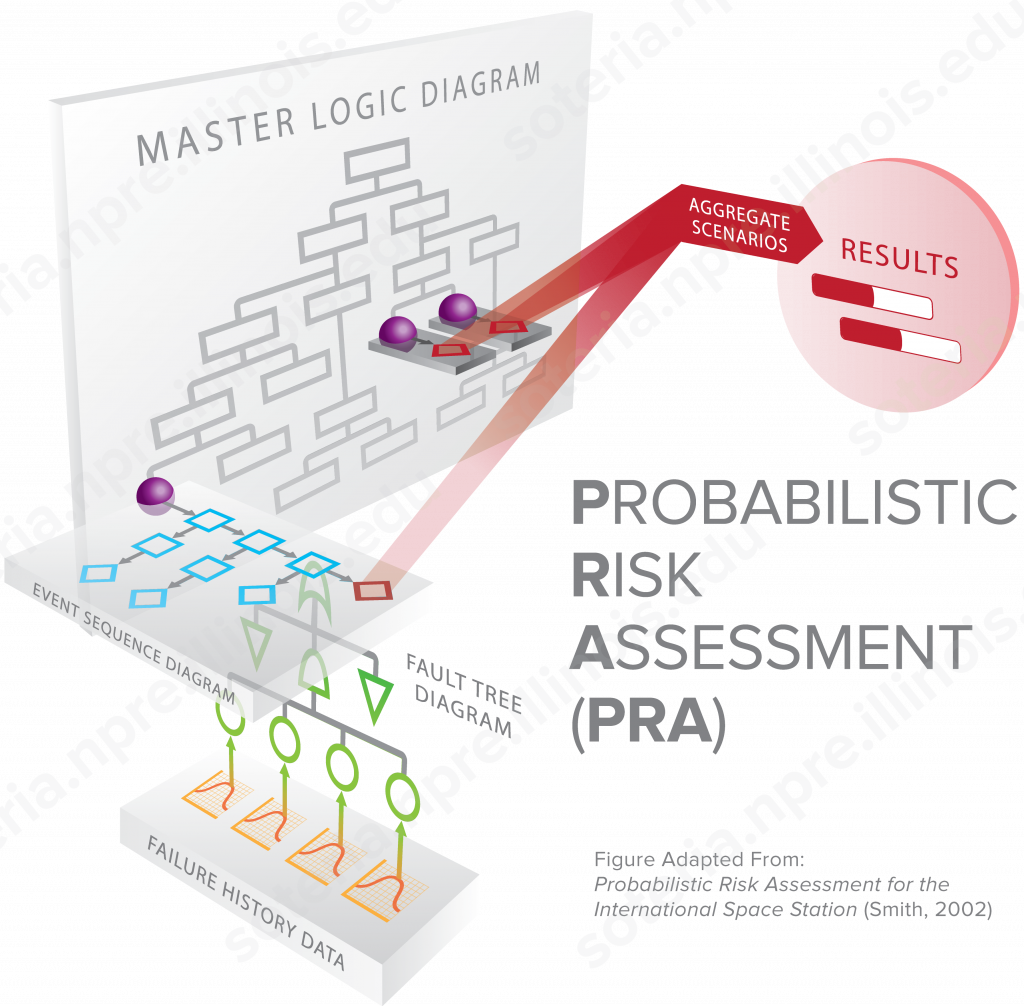The Socio-Technical Risk Analysis (SoTeRiA) Research Laboratory, directed by Professor Zahra Mohaghegh, in the Department of Nuclear, Plasma and Radiological Engineering (NPRE) at the University of Illinois Urbana-Champaign, provides scientific and innovative research solutions to complex real-world problems of safety, reliability, profitability, and security. The SoTeRiA Laboratory has been making scholarly contributions to Probabilistic Risk Assessment (PRA) and bridging foundational PRA research with nuclear industry and regulatory needs, supported by grants awarded by the Department of Energy (DOE), the National Science Foundation (NSF), the Nuclear Regulatory Commission (NRC), the nuclear industry, and the International Atomic Energy Agency (IAEA). For example, the SoTeRiA Research Laboratory collaborated with South Texas Project Nuclear Operating Company (STPNOC) on a $1M project for the Department of Energy’s U.S. Industry Opportunities for Advanced Nuclear Technology Development Program to develop realistic models for Fire PRA and help increase realism in risk estimations for the nuclear industry.
 SoTeRiA functions as a pipeline for conducting basic science research studies and translating them into practical industry solutions. SoTeRiA’s four key areas of scientific contributions to PRA include: Area (I) spatiotemporal coupling of physical failure mechanisms with human/social performance and the incorporation of this coupling into classical PRA using the Integrated PRA (I-PRA) methodology; Area (II) incorporating artificial intelligence (AI) and machine learning (ML) into PRA; Area (III) Probabilistic Validation; Area (IV) integrating safety risk and financial risk. These four areas are operationalized in various research projects funded by national and international funding agencies and have been reported in SoTeRiA publications, earning a large number of citations.
SoTeRiA functions as a pipeline for conducting basic science research studies and translating them into practical industry solutions. SoTeRiA’s four key areas of scientific contributions to PRA include: Area (I) spatiotemporal coupling of physical failure mechanisms with human/social performance and the incorporation of this coupling into classical PRA using the Integrated PRA (I-PRA) methodology; Area (II) incorporating artificial intelligence (AI) and machine learning (ML) into PRA; Area (III) Probabilistic Validation; Area (IV) integrating safety risk and financial risk. These four areas are operationalized in various research projects funded by national and international funding agencies and have been reported in SoTeRiA publications, earning a large number of citations.
With the desire to create an international think-tank for safety, SoTeRiA has conducted research collaborations, for example, with the International Atomic Energy Agency (IAEA) to develop risk methodologies for advanced reactors and with the Japan Atomic Energy Agency (JAEA) to advance simulation models for risk-informed emergency preparedness and response.
The SoTeRiA Research Laboratory has received three grants from the DOE Nuclear Energy University Program (NEUP), one to promote U.S. nuclear fleet sustainability by developing systematic scenario-based Integrated Enterprise Risk Management (I-ERM) technologies (Project #17-12614), another to advance the I-PRA algorithm for the deployment of new technologies (Project #19-16298), and most recently a project to develop a probabilistic validation and risk importance ranking methodology for automation trustworthiness and transparency in nuclear power plants (NPPs) (Project #21-24380). As a pioneering laboratory in the spatiotemporal causal modeling of social and physical failure mechanisms in PRA, SoTeRiA received a five-year NSF grant to incorporate Big Data Analytics into PRA.
The SoTeRiA Research Laboratory has received two grants from the NRC. One NRC award (2021-2024) supports a unique collaboration among experts from academia, national laboratories, and industry to develop a scientifically justifiable methodology for the validation of advanced simulation models under the Risk-Informed Regulatory (RIR) framework. The other NRC award (2022-2025) supports the development of a first-of-its-kind methodology for (i) modeling human interactions with digital twins (DTs) in NPPs and (ii) quantifying the safety risk impact of the human-DT interactions by integrating the coupled human-DT model with PRA of NPPs to support Risk-Informed Regulation for DT applications.
Maintaining close relationships with academia enables collaborators to have access to multidisciplinary experts from diverse engineering and social science backgrounds, and to react quickly to challenging research needs as they emerge. For example, partnering with STPNOC from 2013 to 2017, SoTeRiA contributed to the development of an I-PRA approach for the risk-informed resolution of Generic Safety Issue 191 (GSI-191), which is related to the performance of the emergency core cooling system (ECCS) following a loss of coolant accident (LOCA). To enhance collaboration with industry and enable faster development of innovative solutions to address industry needs, Professor Mohaghegh established the Grainger College of Engineering SoTeRiA Industry Affiliates Program (IAP) for large-scale and cost-shared industry projects.
SoTeRiA also provides education and outreach for the international risk analysis industry. For example, in 2015, SoTeRiA developed and presented the U.S.-China Probabilistic Safety Assessment Workshop on “Risk-Informed Regulation and Safety Culture” in Shenzhen, China, as part of the DOE Peaceful Uses of Nuclear Technology (PUNT) program, which included 72 nuclear industry experts from 28 companies in China. SoTeRiA also provided academic oversight on technical reporting to the NRC and the Advisory Committee on Reactor Safeguards (ACRS). In 2021, SoTeRiA hosted a technical workshop, alongside IAEA collaborators, at the 2021 International Topical Meeting on Probabilistic Safety Assessment and Analysis (PSA 2021) to identify the needs and methodological challenges in risk-informed analysis for advanced nuclear power reactors and discuss research directions and paths to address those needs and challenges to facilitate the deployment of advanced reactors. Currently, the SoTeRiA lab is leading the upcoming Probabilistic Safety Assessment and Management (PSAM) Topical Conference on “Artificial Intelligence (AI) and Risk Analysis for Probabilistic Safety/Security Assessment & Management,” which will be held in October 2023. More information on the 2023 PSAM Topical Conference can be found here.
Click Here to Subscribe to the SoTeRiA Research Lab Newsletter